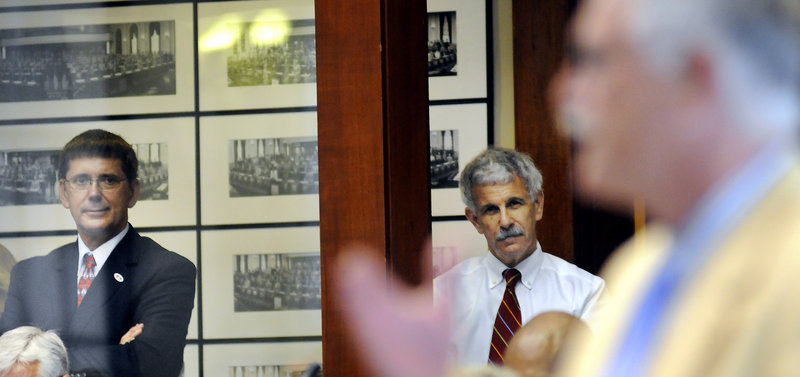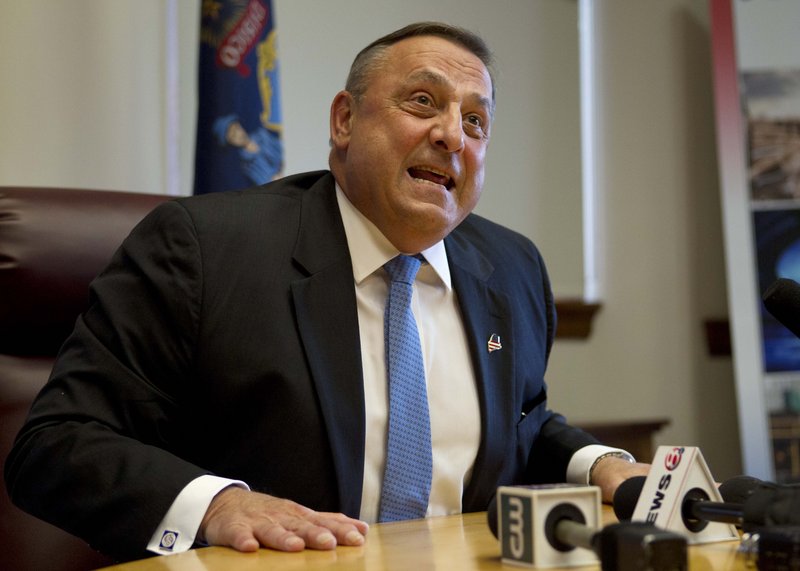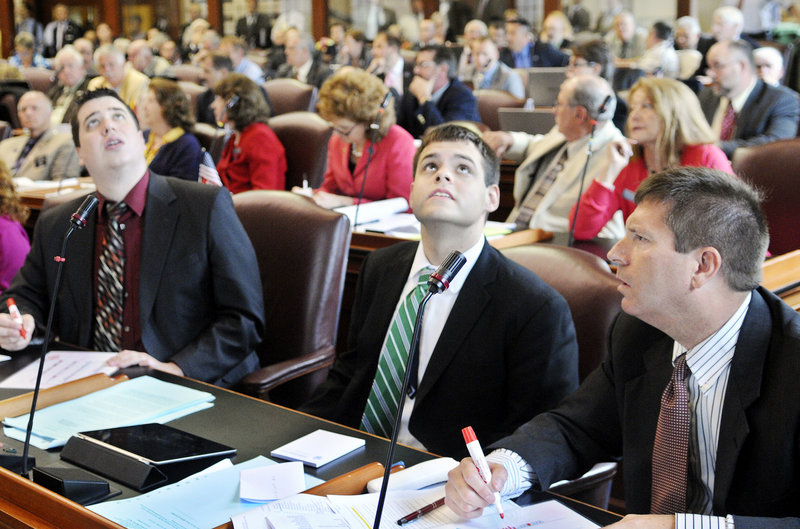AUGUSTA – In the end, the Legislature chose compromise over a government shutdown, a $6.3 billion budget over ideology and campaign promises.
And 30 of the 73 Republican lawmakers chose the budget over the wishes of Republican Gov. Paul LePage.
Wednesday’s votes — 114-34 in the House and 26-9 in the Senate — overrode the veto that LePage issued this week and enacted a two-year state spending plan that neither Republicans nor Democrats liked very much.
Most legislators liked the alternative even less: the first suspension of state services since 1991. The compromise budget passed Wednesday was designed to preempt a shutdown.
House Speaker Mark Eves, D-North Berwick, said in a prepared statement that the vote “put to rest the specter of a state shutdown that has loomed over the Legislature for months. We made the responsible choice to support a bipartisan budget that blunts massive property tax hikes, puts money back into our classrooms and helps our seniors and people with disabilities.”
A shutdown had appeared possible as early as January, when LePage proposed a budget with provisions that were rejected immediately and loudly by Democrats, who have majorities in the Legislature, and more quietly by Republicans, whose votes would be needed to override a veto.
In an impromptu news conference right after Wednesday’s final override vote in the Senate, LePage reacted calmly, but strongly. He criticized Republicans and Democrats alike for a plan that “solidified our place as the 50th worst place to do business for the foreseeable future.”
He said the Legislature is a “country club” where lawmakers are more interested in getting along with each other than with him.
“It’s a real sad day for our elderly and a real sad day for our state,” he said.
Both sides had to give ground to reach the compromise.
Democrats gave up the delay or repeal of a tax cut package that passed with Republican support in 2011. Many Democrats campaigned against the tax cuts while helping their party retake the majority in 2012.
Protecting the tax cuts was a priority for Republicans and LePage, but lawmakers split with the governor on how to do it.
Ultimately, both sides settled on a short-term fix: temporary increases in the sales tax (from 5 percent to 5.5 percent) and the meals-and-lodging tax (from 7 percent to 8 percent) to bridge an anticipated revenue shortfall, more than $400 million of which was the unpaid bill for the 2011 tax cuts.
House Minority Leader Kenneth Fredette, R-Newport, said in his floor speech Wednesday that the compromise was the only path to a balanced budget effective July 1.
“If there were a viable alternative, a path to inject more Republican values into this budget, I would consider it,” he said.
Fredette said he didn’t see one: “There is no Plan B.”
He took a swipe at those in his party who sought to derail the budget compromise.
“The level of vitriol I have witnessed and the circular firing squads I have seen among Republicans cannot stand,” he said. “With our vote for this budget, we are not endorsing tax increases. We are endorsing compromise, an indispensable requirement of governing that has been endorsed by many great Republicans.”
Democratic leaders agreed.
“Today’s vote is a vote for a higher responsibility to put our state on solid footing,” said Seth Goodall, D-Richmond, the Senate majority leader. “It’s also a vote for an opportunity to avoid property tax increases on every Maine homeowner. It’s a vote for an investment in our schools and our children — and it’s a vote to keep the lights on.”
Senate President Justin Alfond said, “This is what we came here to do: work together to find common ground and help our state thrive.”
While most lawmakers said the budget was the best possible deal in a government with a Republican governor and a Democratic Legislature, some criticized it as a surrender of their respective parties’ values.
Rep. Brian Jones, D-Freedom, called the plan a “dog’s lunch.”
“This budget does not reflect the shared values of the citizens of the state of Maine,” he said.
Jones was the only Democrat to vote to uphold LePage’s veto. He was among the nine Democrats who voted against the budget last week. The rest switched their votes Wednesday to override LePage.
Thirty-three Republicans in the House voted to sustain the governor’s veto. They, too, had harsh words for the budget.
Rep. Lance Harvell, R-Farmington, said it may be a compromise, but it was a compromise of values. He rejected the plan’s tax increases, saying that just because “Democrats and Republicans were reaching into your pocket,” the impact on Mainers would be no less.
Rep. Lawrence Lockman, R-Amherst, said the budget “prioritized the political class” over ordinary Mainers. He also objected to the funding for public health care programs that provide “Cadillac benefits” to “drug addicts.”
“The safety net has been stretched to the breaking point because too many able-bodied freeloaders have jumped in,” Lockman said.
The majority of lawmakers said the override was necessary.
Rep. Kathleen Chase, R-Wells, the lead Republican on the Appropriations Committee, which drafted the compromise, said a vote to uphold the veto was a vote for a government shutdown and “chaos.”
Rep. Peggy Rotundo, D-Lewiston, a co-chair of the committee, said a government shutdown would hurt the state’s credit rating and businesses.
Some lawmakers told stories about the last shutdown, when Gov. John McKernan and the Republican minority insisted that the state budget include workers’ compensation reforms. The impasse led to a 16-day shutdown in which about 10,000 state workers went without pay and nonessential services were suspended.
Maine’s Constitution requires the state government to operate with a balanced budget.
During the floor debate Wednesday, Seth Berry of Bowdoinham, the Democratic House leader, read a list of newspaper headlines that described the effects of the 1991 shutdown. “I won’t be a part of a government shutdown,” said Rep. Craig Hickman, D-Winthrop.
The override was cheered by state workers, many of whom filled the House and Senate galleries Wednesday.
When cheers erupted as the House voted to override the veto, the celebration was quickly gaveled down by Eves.
Donald Pickett, 79, a retired Department of Transportation foreman from Pittston, experienced the state shutdown in 1991. He expressed relief when a reporter told him that the Senate had voted to override the veto.
“Thank God,” said Pickett, a volunteer for the Maine State Employees Union. “I am proud of the Republicans and Democrats. They worked out something they could pass.”
— Staff Writer Tom Bell contributed to this report.
Steve Mistler can be contacted at 620-7016 or at:
smistler@pressherald.com
Send questions/comments to the editors.





